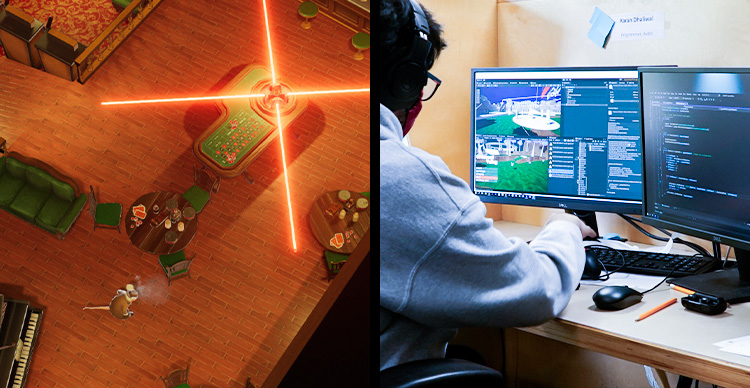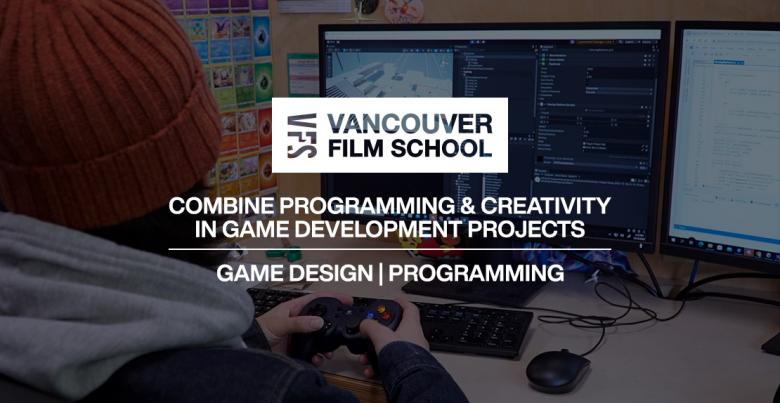Key Takeaways
- Students develop essential technical and artistic skills through Vancouver Film School's comprehensive Game Design program prepares them for industry success.
- Programming languages like C# and C++ serve as the foundation for turning creative game concepts into interactive experiences that players can enjoy.
- Cross-disciplinary collaboration between programmers, artists, and designers forms a critical part of the Programming curriculum at Vancouver Film School.
Game development represents a perfect fusion of technical programming skills and artistic creative expression. Vancouver Film School stands at the forefront of this dynamic field, providing students with comprehensive training programs that combine technical expertise with creative innovation. VFS offers a specialized Game Design program where students learn to develop professional-level games through practical, hands-on experience. Vancouver Film School shapes students into versatile game developers by teaching both the programming fundamentals and artistic elements needed to create compelling interactive experiences that resonate with players and impress future employers.
VANCOUVER FILM SCHOOL PREPARES STUDENTS WITH ESSENTIAL GAME DEVELOPMENT SKILLS
Vancouver Film School equips students with a comprehensive set of game development fundamentals that combine both technical programming abilities and creative design thinking. The Game Design program at VFS condenses what might take years to learn independently into an intensive 12-month curriculum that balances practical coding skills with essential artistic techniques. Students gain proficiency in industry-standard tools and programming languages while simultaneously developing the creative mindset needed to conceptualize engaging gameplay experiences that will stand out in their professional portfolios.
Building Your Technical Foundation Creates Pathways to Industry Success
A strong technical portfolio featuring well-documented programming samples and completed game projects serves as the primary gateway to employment in the competitive game industry. Vancouver Film School graduates benefit from our extensive industry connections, which provide opportunities for networking and mentorship from leading game development studios located in Vancouver's thriving tech hub. The professional-level technical skills that students develop during their time at VFS – including proficiency in programming, engine utilization, and problem-solving – directly address the specific requirements that hiring managers look for when evaluating potential game development candidates.
Essential Technical Skills for Game Development Students
- Proficiency in C# or C++ programming for implementing game mechanics
- Experience with industry-standard game engines like Unity and Unreal Engine
- Understanding of game physics and collision detection systems
- Knowledge of optimization techniques for different gaming platforms
- Version control and collaborative development workflow expertise
- Ability to create and work with technical design documentation
- Problem-solving skills for debugging and troubleshooting code issues
PROGRAMMING LANGUAGE TRANSFORM CREATIVE VISIONS INTO PLAYABLE EXPERIENCES
Programming languages form the essential bridge that transforms creative game concepts into interactive experiences that players can actually engage with. Beginners often start with C# when working in Unity due to its more approachable syntax and extensive documentation, while established studios frequently utilize C++ for performance-intensive projects that require detailed memory management. Vancouver Film School's Programming for Games, Web & Mobile program teaches students multiple programming languages, starting with fundamentals before progressing to advanced game-specific coding techniques that enable students to implement their creative visions efficiently.
How Do Game Engines Support Different Programming Approaches?
Unity and Unreal Engine offer distinctly different approaches to programming, with Unity emphasizing traditional C# scripting while Unreal provides both C++ programming and the visual Blueprint system that reduces the coding barrier for creatively focused developers. Visual scripting systems like Blueprints in Unreal Engine allow designers with limited programming experience to implement complex gameplay mechanics through node-based interfaces that represent programming logic visually rather than through written code. The learning curve between game engines varies significantly based on a student's background, with programming beginners often finding Unity's component-based architecture more approachable, while Unreal's powerful rendering capabilities might better serve visually ambitious projects despite requiring deeper technical understanding.
 Game Design and Programming students at VFS create retail-ready game for their professional portfolios.
Game Design and Programming students at VFS create retail-ready game for their professional portfolios. CREATIVE DESIGN ELEMENTS ELEVATE TECHNICAL GAME DEVELOPMENT PROJECTS
Strong creative design elements transform technically sound games into memorable experiences that forge emotional connections with players. Effective artist-programmer collaboration requires establishing clear communication channels where technical constraints and artistic goals are discussed openly from the earliest stages of development to prevent costly revisions later in the process. The implementation of thoughtful visual design principles, engaging narrative structures, and intuitive user interfaces elevates the player experience beyond mere technical functionality, creating games that captivate audiences through a careful balance of aesthetic appeal and interactive engagement.
Balancing Technical Constraints with Artistic Freedom Produces Better Games
Technical limitations often serve as creative catalysts that inspire innovative design solutions rather than simply restricting artistic expression. Vancouver Film School teaches students to develop essential skills for success in game design through dedicated technical art pipelines that establish clear workflows between programmers and artists, ensuring assets are created with performance considerations in mind. Effective communication between technical and creative team members represents perhaps the most crucial factor in successful game development, with each side developing an appreciation for the other's expertise and constraints to foster collaborative problem-solving that results in cohesive, polished game experiences.
VANCOUVER FILM SCHOOL GAME DESIGN PROGRAM FOSTERS TECHNICAL CREATIVITY
Vancouver Film School distinguishes our Game Design program through a production-focused approach that mimics real studio environments where students work on actual game projects rather than just theoretical exercises. The curriculum integrates hands-on development experience with regular feedback sessions from industry professionals who help students build their first game levels in Unreal Engine and other professional tools. VFS facilitates the crucial integration of programming and creative design by structuring collaborative projects between Game Design students and those from complementary programs like Programming, 3D Animation & Visual Effects, Sound Design for Visual Media, and Animation Concept Art, creating cross-disciplinary teams that mirror industry production pipelines.
Students Create Professional-Quality Game Projects Through Guided Development
The game projects developed by VFS students span diverse genres and platforms, from mobile puzzle games to immersive VR experiences, allowing students to explore their creative interests while building technical expertise. Students receive significant creative freedom within structured project frameworks that establish clear technical requirements and milestones while leaving room for innovative gameplay mechanics and artistic expression. Vancouver Film School provides comprehensive technical support through dedicated lab facilities equipped with industry-standard hardware, specialized software licenses, and access to experienced faculty mentors who guide students through the complex technical challenges that emerge during game development.
STUDENT PROJECT PORTFOLIOS COMBINE TECHNICAL SKILLS WITH CREATIVE EXPRESSION
An effective game development portfolio should showcase a balance of completed projects, technical skill demonstrations, and creative problem-solving examples that collectively illustrate a student's unique capabilities. Employers specifically look for evidence that VFS graduates can build game programming portfolios that impress future employers by demonstrating both technical proficiency and creative thinking. The most compelling portfolios feature playable game builds accompanied by documentation that explains key technical challenges, creative decisions, and the specific contributions the student made within team projects, providing context that helps hiring managers understand the candidate's problem-solving approach and collaborative abilities.
Documenting Your Development Process Shows Technical and Creative Growth
Technical documentation in a student portfolio should provide sufficient detail to demonstrate understanding of programming concepts and implementation strategies without overwhelming viewers with excessive code samples. The creative aspects of game development – including concept art, design iterations, and narrative elements – should be highlighted alongside technical features to showcase the student's holistic understanding of how programming and artistry intersect to create compelling player experiences. Demonstrating a thoughtful problem-solving approach through development process documentation proves particularly valuable to potential employers, as it reveals how students identify challenges, consider multiple solutions, and implement effective strategies – skills that translate directly to professional game development environments where adapting to unexpected technical issues determines project success.
Vancouver Film School prepares students for successful careers in game development by providing comprehensive training that balances technical programming skills with creative design expertise. Our industry-focused approach ensures graduates enter the workforce with professional-quality portfolios that showcase their ability to create engaging interactive experiences. Students interested in exploring how to create immersive VR environments using industry-standard tools and other advanced game development techniques can benefit from VFS's specialized programs and supportive learning environment.
